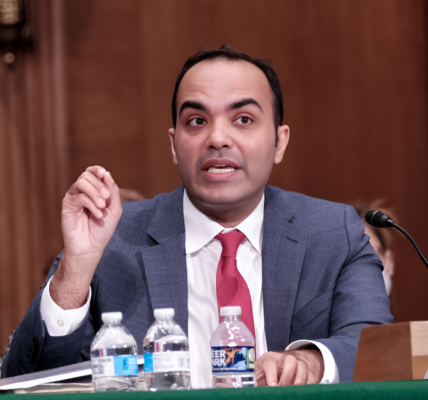
When Patrick McHenry first arrived in Congress in 2005, he was brash, aggressive at 29, with a reputation for being the GOP’s “attack dog-in-training.” Two decades on, and with his retirement today, he has done the trick of shedding that reputation for being a pragmatist and effective legislator. The bow-tied North Carolina Republican had developed from that combative newcomer to a highly capable legislator, to chair the House Financial Services Committee and, briefly and tumultuously, serve as the temporary Speaker of the House.
In an interview with POLITICO Magazine, McHenry discussed his unlikely transformation, the changing dynamics of the Republican Party, and why he left Congress after 20 years.
“I came here with the intention to light things up,” McHenry said, recounting his early days in Washington. But after a few terms of what he described as ineffective brawling, he decided to get serious. “You can either be on all the shows and in all the floor fights, or you can actually be in the right rooms where the decisions are made.”
A Career Born in Crisis
McHenry’s political career started off on the wrong foot. He lost a race for the North Carolina state House as a college student, then went on to work in the George W. Bush administration before returning to his hometown near Charlotte to “set up life.” But six months later, an open seat in the state legislature drew him back into politics. “It wasn’t planned,” McHenry said. “When I left D.C., I was firmly done.
From there, his rise was meteoric. A year into his state House tenure, his district’s congressional seat opened up. “The electorate wanted someone with energy, someone who would go fight,” he recalled. At just 29, McHenry was elected to Congress, arriving with a conservative mandate and a fiery determination to shake up Washington.
The district he represented was flailing at the time, with an unemployment rate greater than even Flint, Michigan. McHenry ran on the economic cost of poor trade deals and his district’s imploding textile, furniture, and fiber-optic cable industries—all matters that foreshadowed the populist wave of the Trump era.
Learning to Lead
McHenry admits that his approach to Congress was flawed. “My first two terms were a learning experience about how the institution worked—touching the hot burner,” he said. He soon learned that loudness wasn’t effectiveness. “In my second term, I discovered that I wasn’t moving my colleagues to vote with me, wasn’t building capacity internally, and wasn’t helping to move policy.”
The turning point came through mentorship and self-education. McHenry immersed himself in the mechanics of legislating and power dynamics, drawing lessons from figures like Winston Churchill and former Speaker Jim Wright. He also studied the leadership style of Tom DeLay, who was known for his mastery of vote counting and delivering on promises.
“There’s a discipline to effective leadership,” McHenry said. “You need accurate vote counts and the capacity to deliver.”
By the time the Tea Party wave swept into Congress in 2010, McHenry had transformed into a mentor for new members. “I’d learned what not to do,” he said, offering guidance to those who shared his initial fervor but lacked institutional knowledge.
Choosing a Different Path
Although John Boehner once prophesied McHenry would become Speaker, he went a different way and decided to stick with the theme of financial policy. As the chair of the House Financial Services Committee, he led several complex reforms related to legislation on cryptocurrency and other financial matters.
In October, McHenry found himself thrust into the national spotlight as interim Speaker after Kevin McCarthy’s ouster. He described the experience as “out of body,” and said it only confirmed his decision to retire.
“After that crucible, when all the dust settled, I had complete peace,” McHenry said. “I knew it was the right thing. That I was done.
While some may think that his departure is untimely, McHenry believes in the importance of term limits. “Twenty years is enough,” he said. “It’s healthy for institutions to have turnover.” Legacy of Pragmatism
Looking back, McHenry sees his evolution as a testament to the power of adaptability. “The hardest thing was to stop and pivot,” he admitted. But by shifting from firebrand to statesman, he carved out a legacy defined not by headlines but by impact.
And McHenry’s story, part of a saga of Republicans searching for identity, is one that reminds you that patience and discipline and quiet governing are their coin of the realm. It’s a career lived well, to him. “I wanted to pass conservative policy,” he said. “And in the end, I think I did.”





